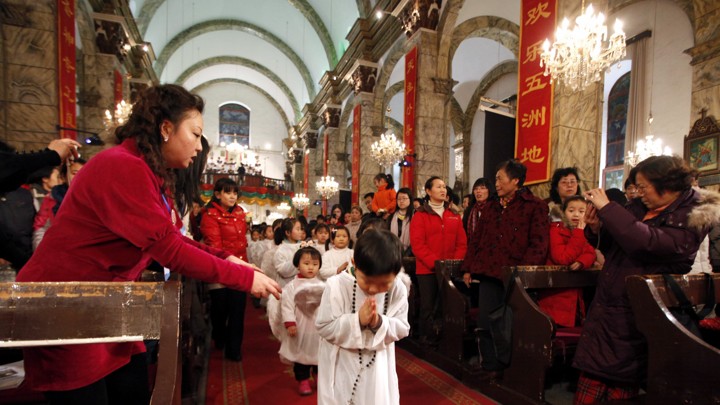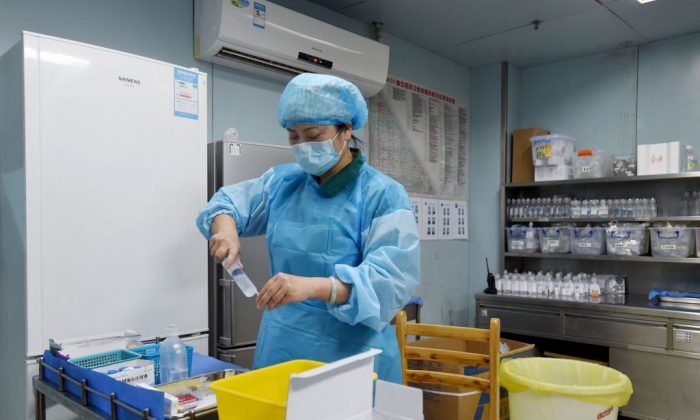The disappearance of a bishop is an object lesson in interacting with Beijing.
By BETHANY ALLEN-EBRAHIMIAN
 Children walk down the aisle during Christmas Mass at a Catholic church in Beijing.
Children walk down the aisle during Christmas Mass at a Catholic church in Beijing.
As China’s economic and military power has expanded over the past decade, Beijing has shown a proclivity to renege on agreements and to make access to its markets conditional on acceding to its shifting demands.
Countries, companies, and international organizations have found it difficult to push back.
The Vatican, as both a state and the spiritual head of a major international institution, is now grappling with this challenge.
In September, the Holy See inked a provisional agreement with Beijing in an attempt to mend an almost 70-year-old schism.
Vatican leaders argued that the deal would promote unity.
They
insisted that it would enable them to better minister to their Catholic flock in China.
They dismissed concerns that it constituted “selling out” to a repressive government.
Then a Chinese bishop disappeared.
The suspected arbitrary detention of a Vatican-appointed priest last month has reinforced worries that Beijing won’t ease its pressure on the Church but will instead use the deal to push for even more control.
The implications stretch well beyond the religious sphere—in fact, the Vatican deal is a broader object lesson in the costs of doing business with Beijing.
If China is willing to backtrack on its agreement with the Vatican, that bodes poorly for foreign governments, international companies, and other organizations involved in dealmaking with the country.
Since the Vatican and Beijing broke diplomatic ties in 1951, the Church in China has been divided into official state-sanctioned Catholic places of worship with bishops appointed by Beijing, and underground churches whose leaders are secretly appointed by the Vatican but not officially recognized by the Chinese Communist Party.
CCP authorities have harassed and detained underground clergy, and the dueling bishoprics have caused confusion and division among the laity.
The pope has not been allowed to visit China or even to enter its airspace.
Vatican leadership suspects that the schism is one reason for Catholicism’s stagnant growth in China. There are
about 10 million Chinese Catholics (though estimates vary), a number that has remained relatively steady in recent decades while the number of Protestant Christians has risen dramatically, reaching up to 100 million by
some counts.
That was a major motivation for the deal, which has been under discussion since
2014.
Under the terms of the agreement, which has not yet been fully made public,
Francis has
recognized seven party-appointed bishops, while Beijing has in turn recognized a portion of the formerly underground Vatican-appointed ones. Wenzhou
In the future,
the Holy See is expected to reach a compromise with Beijing over new appointments, in an arrangement that gives the CCP control over who is selected.
But then last month,
Shao Zhumin, a Vatican-appointed bishop of the eastern city of
Wenzhou, who remains unrecognized by Beijing,
disappeared.
It was the latest in a string of detentions that Shao has faced in recent years.
Some Chinese Catholics had naively hoped that such arbitrary arrests, a relatively
common occurrence for underground priests, would end after the agreement was reached.
“The government has not given up its hope for control. They want the Church to be another tool of the state,” Paul Mariani, a Jesuit priest who researches Chinese religious policy at Santa Clara University, told me.
“That’s common in China, across labor unions or NGOs—they all have to fall under the party at some level.”
Shao’s disappearance has, so far at least, seemed to vindicate the deal’s naysayers.
Critics have accused the Vatican of giving in to an atheist, communist government with a long history of persecuting the faithful.
Joseph Zen, the retired cardinal of Hong Kong and a fierce critic of the CCP, called the agreement “an incredible betrayal,” accusing the Holy See of “giving the flock into the mouths of the wolves.”
Sophie Richardson, the China director of Human Rights Watch, told me,
“Watching a major world faith come to an agreement with an authoritarian government that’s notorious for repressing religious freedom and to effectively cede some authority to that government sets a very worrying precedent.”
The deal comes as the religious-freedom environment in China has reached its worst level in years, as
the government has detained 1 million Muslim citizens in illegal detention camps, banned online Bible sales, increased control over churches and temples, and sought to incorporate party ideology directly into religious doctrine.
“The pope has effectively given Xi Jinping a stamp of approval when the latter’s hostility to religious freedom couldn’t be clearer,” Richardson said, referring to the Chinese president.
It’s not just domestic and religious groups that have felt the tightening grip of the Communist Party.
International companies are forced to hand over their proprietary technology in order to do business in China.
The Chinese government blocks the websites of businesses that do not abide by its tough online censorship laws, leading major companies such as Apple and LinkedIn to comply with official demands to remove certain content.
In April, Beijing
demanded that international air carriers change their website language regarding Taiwan to bring it in line with the Chinese government’s position that the self-governing island democracy is a Chinese province, threatening consequences for airlines that did not comply by a given deadline (to date, almost all airlines have complied).
“It’s hard to imagine China putting as much pressure on those organizations 20 years ago,” said
Rush Doshi, a postdoctoral researcher specializing in China at the Brookings Institute.
“It was afraid of the commercial and international backlash. Now there is less concern about the backlash because China is bigger and more powerful. They couldn’t afford to adopt that attitude when their economy was far smaller than that of the United States.”
In recent years, the CCP has also applied similar pressure to major international institutions such as the United Nations, seeking in some cases to change the very nature of liberal bodies to more closely resemble its own illiberal preferences.
China has sought to erode human-rights enforcement at the United Nations by packing hearings with pro-Beijing participants, offering generous investment deals to countries in exchange for their support, and blocking activists from entering UN grounds.
“Everyone is being forced to play by Chinese government rules,” said Shanthi Kalathil, who directs the International Forum for Democratic Studies at the National Endowment for Democracy. “Increasingly, we see the Chinese government trying to impose its own definition and its own rules on international institutions and other governments. And that extends to governments such as the Vatican, it extends to arenas such as the UN, and to Chinese government bilateral relations with other countries.”
And in some cases, even when an equitable deal has been reached,
the party has demonstrated a growing willingness to backtrack on commitments.
In 2015, for example, Xi reached two agreements with President Barack Obama—to reduce cyber-hacking attempts and to cease China’s militarization in the South China Sea.
Despite these high-profile deals, however, the Chinese navy continued to build military facilities in contested waters in the South China Sea.
And in October, the U.S. government revealed that Chinese-sponsored cyber-hacking attempts on U.S. targets had once again surged.
“If China can renege on a deal with a superpower—over hacking and over the South China Sea—then it can renege on deals with middle powers or small countries without fear of consequence,” said Doshi.
Xi has spent his six years as president strengthening the party’s grip over every aspect of Chinese society and cracking down harshly on any organization that could potentially compete for the loyalty of Chinese citizens, particularly targeting religious groups.
From that perspective,
the agreement with the Vatican is the party’s attempt to finally eliminate the gray area in which underground churches have long operated, rather than a desire to cede partial control over bishop appointments to a foreign head of state thousands of miles away.
“How many times have we seen this movie?” asked Richardson.
“I’m not sure why the pope and the Vatican will succeed when many others have not.”

 Children walk down the aisle during Christmas Mass at a Catholic church in Beijing.
Children walk down the aisle during Christmas Mass at a Catholic church in Beijing.